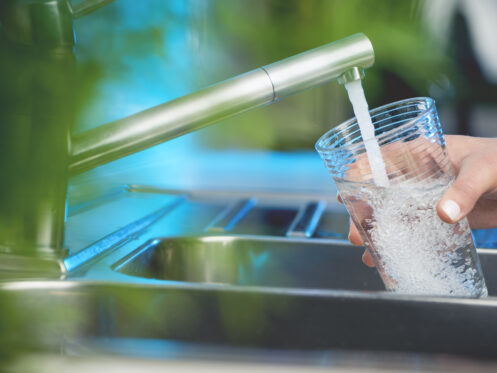Water quality plays a crucial role in the health and safety of your family. While many factors can affect your water quality, many lie within your home. You might notice a bad smell, or the water may be cloudy. Installing a filtration system can go a long way toward improving what comes out of the tap. But there is more you can do.
Plumbing materials, especially those used in your water intake, can impact the quality of your home’s water. The age and upkeep of those pipes are also factors. That’s why plumbing repairs and maintenance should be a priority. These services can prevent long-term issues within your plumbing system and save you from the headache of water quality problems.
1. Corrosion in the Water Heater
Water heaters, especially those around a decade or so in age, have parts that will start to corrode. This is likely to happen sooner without proper maintenance and repair, including small part replacement and tank draining each year. If you notice rattling and knocking sounds when the hot water is on, this is a sign that your water quality is affected and could worsen.
Sediment naturally builds up in the tank. This hinders heat transfer and can promote corrosion. The corrosion will then leach into the water, affecting your skin and the tap water’s taste, look, and smell. Replacing the anode rod can help prevent corrosion. This sacrificial rod slowly dissolves, which helps prevent the tank from rusting. This rod can be replaced by a qualified plumber.
Here are some things to look for that indicate erosion in the water heater:
- Rusty yellowish or brown color in the tap water
- Foul odors from water such as rotten eggs
- Cloudy or murky water
- Heavy metallic taste of your water
2. Soft Water in Plumbing
While not discussed as often, soft water can be a huge red flag for water quality. Because it doesn’t immediately cause discoloration or smell, it’s not noticed until the effects become unhealthy. Soft water can be due to many factors, including your water softener’s setting.
Soft water is water with too few minerals. A water softener works by adding sodium. As a result, soft water tends to have a salty scent and flavor. This could increase the amount of sodium in your diet, which is especially unhealthy for those with heart problems and high blood pressure.
Soft water can leach unhealthy metals from the pipes and lining and tends to pick up soil on the inside of your pipes. This can weaken and damage the pipes and compromise the quality of your water. This can be especially dangerous if you have old lead pipes, as the danger of ingesting lead is well-known. If lead and other metals leach into soft water, it will change your drinking water’s taste and could make you and your family sick. If you have an older home, it’s a good idea to have the water pipes tested.
3. Hard Water and Dishes
Not everyone thinks about it, but your dishwasher needs quality water to function at optimal levels. Hard water can damage the dishwasher and affect its performance.
Hard water contains a great amount of minerals, primarily calcium and magnesium. These minerals can be beneficial to your health, but they can wreak havoc on water quality and your plumbing. These minerals can come from the ground, but they can also come from piping material from old or uncared-for pipes. You may be familiar with the hard, white mineral deposits that build up around plumbing fixtures. These can also harm your dishwasher.
.
Look for these signs that poor water quality and pipe issues might be causing a problem with your dishwasher:
- Clogged nozzles
- Cloudy glassware
- Mineral deposits on the heating element
- Dishes with residue
- Dishes that won’t get clean
- Poor drainage
4. Water Heater Sediment
As we spoke about in a previous section, a water heater can easily have sediment building up inside of the tank. Each year, you should call a plumber to drain the tank and remove such particulates. To prevent breakdown, it should happen twice a year as your water heater ages around the decade mark. Other than breakdown, though, this sediment can easily get into drinking water.
5. Heavy Metal and Contaminants in Drinking Water
If your plumbing pipes were installed prior to 1986, chances are you have some material prone to leaching contaminants into the water system. However, proper maintenance and repair by professionals can prevent your family’s health from becoming compromised. You may want to schedule a maintenance visit with a skilled professional to determine if your piping is the cause of dangerous chemicals and minerals getting inside the water you drink.
Different types of pipe materials are found in homes. Depending on the age of the material, pipes made from one of the following could be the reason your drinking water is not safe for consumption.
Galvanized Pipes
Rust and corrosion are common with this type of plumbing pipe. Older galvanized pipes also have a higher lead content. These pipes should be replaced as soon as possible, especially if rusty smells and tastes are affecting your tap water.
Lead
Lead can enter your water supply through aging lead pipes or lead-based solder used in plumbing connections. Lead ingestion can lead to cognitive impairments, including both logical thought and sometimes motor function. Lead piping should be considered for replacement.
PVC
While corrosion-resistant, polyvinyl chloride pipes sometimes leak additives into the water over time. Be sure that these pipes are checked for problems and replaced when their lifetime is up.
Copper
This is the most common type of pipe. They’re strong and last long, but watch out for metallic smells and tastes. Too much copper can cause health problems.
6. Low Water Pressure
Water pressure is a water quality issue that may seem out of place. Still, low water pressure can mean unsatisfying showers where you can’t get clean or dirty dishes that don’t get rinsed well. Low water pressure is most commonly caused by old leaking or blocked pipes in or around your home. A skilled professional from Huft Home Services can inspect your plumbing and determine the root cause of your low water pressure.
Plumbing Services in Sacramento
Huft Home Services is a plumbing and HVAC company in the Sacramento, CA area. With a love for customers and the whole community, we have become a trusted name among homeowners who require plumbing experts to repair, maintain, and replace their fixtures and pipes. We deal with hard water and water quality every day, and our experienced plumbers can inspect your plumbing for any issues. We can visit yearly to keep your plumbing and water at top quality.
Other services we offer include whole house water filtration systems to further improve the smell and taste of your water. Our services also extend to heating and cooling, including indoor air quality solutions, and electrical services.
If you’re concerned about your water quality in Sacramento, contact Huft Home Services for a quote and schedule reliable service.




